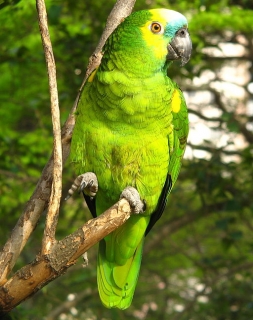Project Regions:
Blue-fronted Amazon |
|
|
Collaborators/Funders
SOS FAUNA (former), Rescue Center in the state of Mato Grosso do Sul (CRAS-MS), Projeto Papagaio da Caatinga, American Bird Conservancy (ABC), Kyle Brown Legacy, Barbara Delano Foundation, Pernambuco environmental state agency’s rescue centre (CPRH CETAS Tangara), the wildlife centre of the Caatinga (CEMAFAUNA) at Sao Francisco University (UNIVASF), Estância Natureza Lins Rescue Centre, ASM Cambaquara
Amazon populations are being decimated by illegal and legal trade
Since 1981, nearly a half-million wild Blue-fronted Amazons (Amazona aestiva) have been traded on the international market. Overexploitation has caused local extinctions in its native range.
Progress and outcomes: Since 2005, WPT has supported research and anti-trade efforts for Blue-fronted Amazons. This work includes:
- Documenting current trade practices in the species' native country and others
- Providing funding for enclosures and equipment
- Aiding rehabilitation and releases
- Supporting nest surveys and monitoring
WPT has supported hundreds of Blue-fronted Amazons caught in trade by providing veterinary care, training in the care of young chicks, funds for rehabilitation flights, and microchips for tracking after release. The Trust and its local partners have conducted soft-release reintroductions into areas where the birds have disappeared, as heavy trapping has caused local extinctions.
Focus of future work: WPT is currently working with the Projeto Papagaio da Caatinga and more recently Estância Natureza Lins Rescue Centre to rehabilitate confiscated Blue-fronted Amazons and other parrots caught in trade. Blue-fronts are being received more often at ASM Cambaquara, on the Atlantic coast of Brazil, where they are being rehabilitated and sent back to new partner protected areas. The WPT's partnership with Lins Rescue Centre began in 2020 when they received a large confiscation of Blue-fronted Amazon chicks. After the birds were cared for, two groups were acclimated to their surroundings and released, and a third will be sent to a nearby state where they will be part of the reintroduction program in the State of Mato Grosso do Sul. As of 2021, over 500 parrots have been rehabilitated and released.
Wild population: As low as 1,000,000 and decreasing.
Where found: A.a. aestiva: E Brazil, from Pernambuco and S Para to W Sao Paulo and S Mato Grosso.
A.a.xanthopteryx: S Mato Grosso and formerly W Rio Grande do Sul, Brazil, N and E Bolivia, and Paraguay to N Argentina; mixes with aestiva in NW Paraguay, S Mato Grosso, and NE Argentina.
History: The Blue-fronted Amazon (Amazona aestiva) is trapped in large numbers for the wild bird trade. In NE Brazil it has suffered severe declines. The International Union for the Conservation of Nature (IUCN) reviewed its status and uplisted the species to Near Threatened. Since 1981 when it was listed on CITES Appendix II, hundreds of thousands of wild-caught individual Blue-fronted Amazons have been recorded in international trade.
Threats:
- Heavy trapping for the bird trade
- In some areas local extinctions due to habitat loss
Ecology: The Blue-fronted Amazon is found in a range of wooded habitats and open country with trees, up to an altitude of 1600m (E Bolivia). Birds take fruit and seeds from wide variety of plants and trees. They are seen in communal roosts and are found in pairs or flocks of several dozen birds, sometimes quite close to human habitation.


































